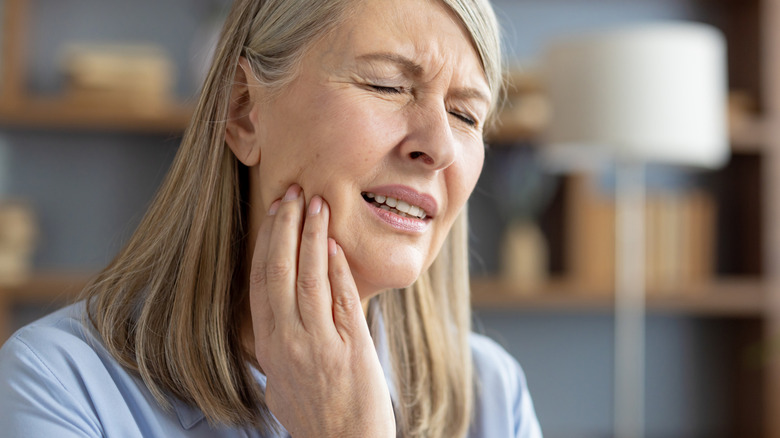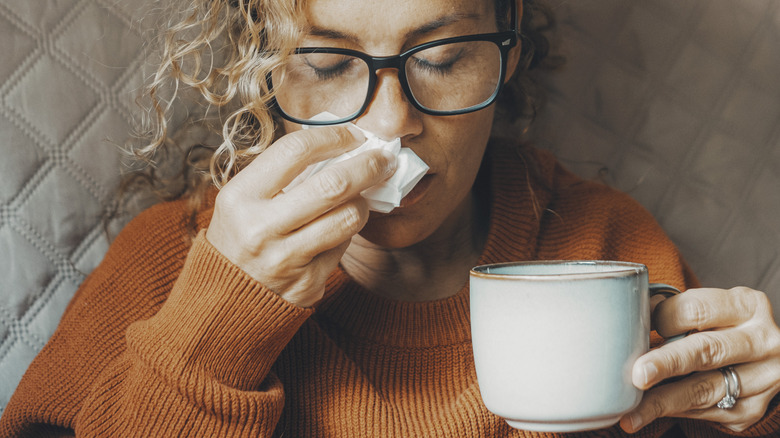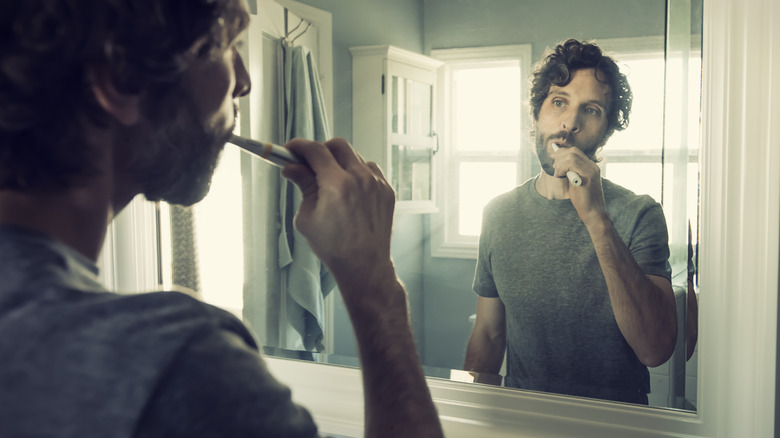The Reason Your Teeth Hurt When You're Sick
Colds and viruses can make many parts of your body feel terrible. From a throbbing head to a sour stomach, you may be deluged with discomfort. While this isn't a shock — you're sick, after all — you may be surprised when even your teeth start to hurt. There are a couple of reasons your teeth don't feel right that aren't related to actual dental conditions like cavities or loose tooth crowns. The first reason is that you may be feeling a side effect of sinus pressure caused by congestion, inflammation, infection, or a combination of all three.
Your sinuses are somewhat like "holes" that sit in the areas between your eyes and your upper back teeth. Normally, you won't notice them. But if you have a cold that causes fluid to build in them, they will probably get irritated and inflamed (e.g., sinusitis), or if you have a full-blown sinus infection (read more about the signs you might have a sinus infection). At that point, your sinuses will begin to expand. When they do, they will push outward in all directions, including against the roots of your molars. Although it may seem like your teeth are radiating pain, they're not the problem. Your teeth are just responding to the forces pressing against them.
But here's a question: What if all of your teeth hurt? In that case, you might still be suffering from one of the symptoms of the common cold or flu: dry mouth.
Advantages of keeping a moist mouth
Many people find it difficult to drink enough liquids when they're under the weather, leaving them more likely to have a dry mouth. The drier your mouth becomes, the more sensitive your teeth (and gums) can become because they're not as protected by saliva. The most straightforward remedy if you suspect you're dehydrated is to drink water and other beverages. Oh, and make sure to drink extra if you're taking a cold medication that can make your mouth dry, such as painkillers, decongestants, and antihistamines.
As your cold or sinus infection starts to wane (which can take several weeks), your teeth should start to feel normal again. In the meantime, try to stay on top of your oral care routine. Though you might not feel like brushing your teeth when you're sick, do it anyway. Cleaning your teeth keeps unwanted bacteria from building up in your mouth. Plus, if you're sick enough to need hospitalization, you'll want to maintain regular brushing to lower your likelihood of developing hospital-acquired pneumonia.
Pampering your mouth pays off
According to a 2024 review in JAMA Internal Medicine, individuals who were placed into intensive care units and who received normal oral care were less likely to develop pneumonia (and more likely to recover sooner and have shorter stays) than those who did not. Findings from a 2020 study in Open Forum Infectious Disease show similar evidence, noting a 56% reduction in rates of pneumonia in non-ventilated patients who brushed their teeth.
Of course, it can be challenging to motivate yourself to brush your teeth when they ache. But it's a healthier practice than waiting until your cold subsides to give them a little TLC. As dentist Dr. Anne Clemons noted in an interview for the Cleveland Clinic, "The mouth is connected to your whole body. We can't just kind of separate it and put it over here. . . it's all connected, so the cleaner and healthier your mouth is, the better and healthier you are overall."
If you find brushing uncomfortable, use a toothbrush with soft bristles to provide a gentle clean that's less apt to irritate the sensitive areas of your mouth. Just be sure to toss your toothbrush after you've fully recovered. Used toothbrushes have the ability to harbor germs for weeks.


